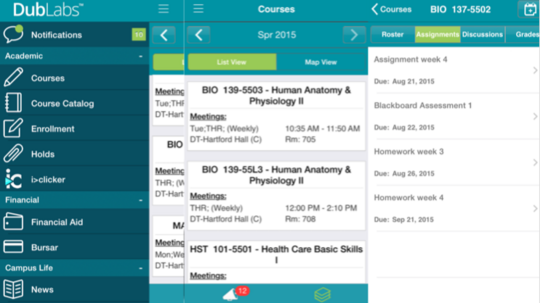
If colleges want to connect with their students, they're going to have to go where the students spend most of their time: on their smartphones. That's the lesson edtech app developer DubLabs has been imparting to colleges and universities since it was founded in 2008. The Vienna, Va.-based company builds apps for schools, with close to 150 schools using apps built by DubLabs to connect with students.
"What's changed the most since we started is that colleges have gone from thinking of apps as something nice to have, mainly for marketing, to something much more essential," said Chris Hopkinson, the vice president for strategy and business development at DubLabs. "In the last couple of years, universities have realized that students prefer to use mobile apps and that freshmen are starting come in with just a smartphone and a tablet, mobile only."
The apps DubLabs builds for its clients, which include the University of Oklahoma, DePaul University and Mercer University, act as a portal for all kinds of information and student services, with students signing into it the way they would on the college website, but with a different kind of experience. It fits much more with the way people use mobile devices to keep on their work and social lives, with more immediate information and the ability to deal with pressing matters on the go.
"It's a dashboard type of experience," Hopkinson said. "It tells you about your classes, any assignments, outstanding parking tickets and about events like upcoming basketball games."
It's a different kind of tool than what schools may be used to, but it's what schools need to keep students involved and engaged. The right app can play a part in helping attract and retain students. It can even turn around possible crises about registering for classes and maintaining enough credits. That's an aspect that often catches the attention of administrators, Hopkinson said, convincing them that they need to get an app or revamp their current version.
"Sometimes schools want to just put their website on the app and that's a mistake. Half of the apps we build are replacements for older versions like that," Hopkinson said. "We work to educate schools about the mobile revolution."
Originally DubLabs worked behind the scenes with partner edtech companies like Datatel and Moodlerooms to create and sell its developments.
"It's a really tough market to get into," Hopkinson said. "Schools don't just buy startup tech, they want proof of success. We were lucky to be there early on with big partners like Datatel and Moodlerooms."
And in building a successful product for colleges, DubLabs sees the push notification as a key component. Though it's not exactly a flashy feature, push notifications are now a basic part of the psychology of mobile apps. Notifying students about new assignments or changes to events makes them more likely to use the app regularly. It seems comparable to how people engage with messaging and social media apps, relying on the buzz or beep of their phone to inform them of something they might want to check in on. That kind of engagement is how the colleges should approach apps, Hopkinson said, as opposed to the idea of long explorations of a website.
"Students mostly use [the apps] for 90 seconds or less," Hopkinson said. "But they're checking it ten times a day."




